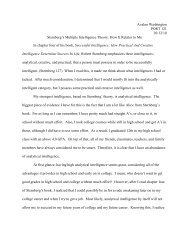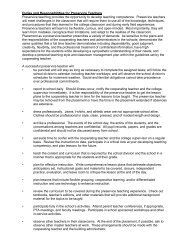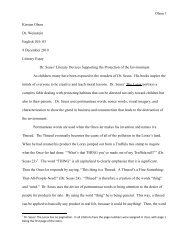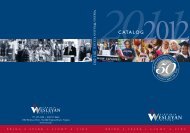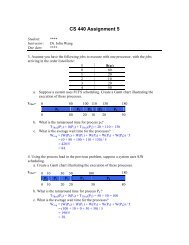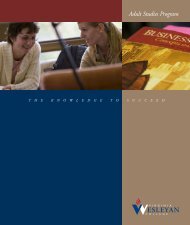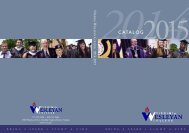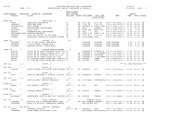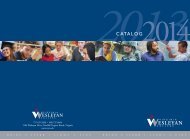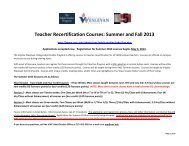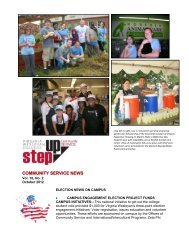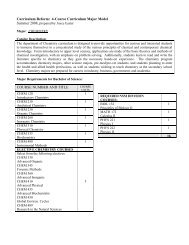2008-2009 Catalog - Virginia Wesleyan College
2008-2009 Catalog - Virginia Wesleyan College
2008-2009 Catalog - Virginia Wesleyan College
- No tags were found...
You also want an ePaper? Increase the reach of your titles
YUMPU automatically turns print PDFs into web optimized ePapers that Google loves.
176 CAMPUS LIFECAMPUS LIFEAnecessary complement to education in anycollege classroom is growth through campus life.On any given day at <strong>Virginia</strong> <strong>Wesleyan</strong> you may findmembers of our diverse student body organizing to voiceconcerns, participating in athletics, singing with the choir,practicing for a play, planning for an art show, gatheringnews for the student newspaper, leading prayer and Biblestudy, partaking in an aerobics or rock climbing session,and engaging in social activities in the Jane P. BattenStudent Center.At <strong>Virginia</strong> <strong>Wesleyan</strong> students have always been special,and our student life program strives to uphold that motto.Although the college exists on firm principles of residentiallife, its student programming incorporates the input of allstudents and strives to meet the needs of commuters andadult students as well as traditional residential students.Guided by the vice president for student affairs anddean of student’s staff, <strong>Virginia</strong> <strong>Wesleyan</strong>’s student lifeprogram and services encourage all students to grow outsidethe classroom.Residential Living: The college campus is patternedclosely after Thomas Jefferson’s adaptation of the Oxford-Cambridge plan. Residence halls at <strong>Virginia</strong> <strong>Wesleyan</strong> aredesigned to foster a sense of community. It is in theresidence halls that you will encounter a variety ofinteresting people and experiences. Additionally, you willfind many opportunities for cultural, educational, socialand recreational enrichment.The <strong>Virginia</strong> <strong>Wesleyan</strong> campus is structured intoacademic villages. An academic village includes classrooms,faculty offices, and student residences with lounge areas.Within Bray Village and Village II there are two academicbuildings and four residence halls. Brock Village has threetraditional residence halls and three residence halls thatoffer students apartment-style living. The rooms in BrayVillage, Village II, and the traditional residence halls inBrock Village are designed for single and double occupancy—and for personalized living. Rooms are furnished withbeds, dressers, full-length wardrobes or closets, desks, andchairs. Laundry facilities are available on each residence hallfloor. Each unit of the apartments and townhouses in BrockVillage consists of four bedrooms, two bathrooms, a livingarea, and kitchen. Each townhouse has a washer and dryerand the apartments have laundry facilities on each floor.The newly constructed Village IV has 24 townhouses whichaccommodate 96 students. You are encouraged topersonalize your room, apartment, or townhouse accordingto your tastes as well as the taste of your roommate(s). Byproviding your own rugs, lamps, curtains, and other items,you can transform your living space into a comfortablehome. The campus dining center includes a 500-seatcentral dining facility, private dining areas, kitchen, foodpreparation areas and additional “café” seating in theAlumni Galleria. Included in the campus dining centerfacility are the college post office and business office.The college requires all students to live in the collegeresidential housing facilities. Exceptions are granted tothose students who (1) elect to live at home with one orboth of their parents; (2) are married students; (3) arecarrying less than a full course load (less than 12 semesterhours); (4) petition the college and are granted permissionto live off campus. Students who have been residents of theHampton Roads area of <strong>Virginia</strong> for the year prior to theirinitial application for admission to the college areconsidered commuter students and have the option ofcommuting from their local residence or residing in thecollege’s residence hall facilities. Moreover, students who areunder the age of 18 or who are 24 years of age must requestpermission to live in the college’s residential facilities.Students who are pregnant must petition the Dean ofStudents for the purpose of making arrangements regardingtheir housing situation.The Office of Residence Life is responsible for selectingand training the residence hall staff, coordinating hallpolicies and developing cultural, educational, social andrecreational activities. The social and recreational activities,including the annual “Seafood Party in the Dell,” arecomplemented by a number of interesting educational andcultural events.Commuting: Along with campus residents, commuterstudents are a vital part of the <strong>Wesleyan</strong> community. It isthe goal of the student life program to integrate the residentand commuter populations in an effort to enhance campusactivities for everyone.Theme parties, student publications, campus intramurals,sorority and fraternity functions, worship services,athletic contests, Lake Taylor Music Festival and SpringFling are just some of the activities and opportunitiesafforded our commuter and resident students.Through the help of the Commuter Service Office,commuter students are kept informed, provided specialassistance and encouraged to take full advantage of campusresources and the co-curricular activities of the college.Jane P. Batten Student Center: For both the residentand commuter student the Jane P. Batten Student Center isfull of exciting activities. The $18.6 million center is hometo a spacious fitness center featuring dozens of weightmachines, bikes, Stairmasters and other equipment; aneight lane swimming pool complemented by a ten personjacuzzi and saunas; three racquetball courses; an indoorelevated jogging track; a convocation center/gymnasium; apractice gymnasium; a rock climbing wall; the MarlinGrille; and the Scribner Bookstore.The Community Council: The <strong>College</strong>’s commitmentto the building of a vital community finds expression in<strong>Virginia</strong> <strong>Wesleyan</strong>’s structure of campus governance. TheStudent Government Association, the Faculty Assemblyand the Administrative Council meet regularly to makepolicy regarding the respective spheres of concern. At leastthree times annually, faculty, staff and student



